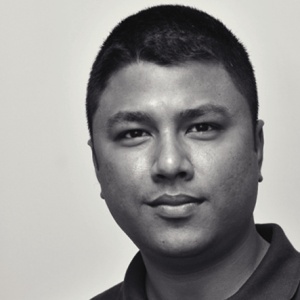INDIA, LONG WAY HOME | ASIA-EUROPE SHORT STORY CONTEST
Mriganka Kalita’s short story received 2,903 votes. This image was captured 1 September 2013 at 11:59 pm (Singapore SGT).

Mriganka Kalita, India
The Foreigner In The Ferry
A short story by Mriganka Kalita
The ferry to Elephanta Island was scheduled to leave from Gateway of India at 3pm sharp. It is 3:30pm now. The ferry is still gently bobbing in its place and occasionally bumping against the stone jetty. Not that it mattered much to Tim Cotton, the professor of history at the University of Cambridge. He’s been in India for almost two weeks and if there’s one thing he has learnt while travelling is that one needs to be patient. And to his great surprise, he’s discovering that he is actually quite a patient man. Quite contrary to the image he has in university circles back home. He also got acquainted with the actual full form of IST. It is not Indian Standard Time. It is Indian Stretchable Time.
Tim sized up the man sitting opposite him on the hard wooden bench. The only other foreigner in the ferry. After having travelled a fair bit as a visiting professor in various Far Eastern countries, he prided himself on his ability to guess people’s nationalities. He relished the look of surprise on his subjects as he, more often than not, correctly guessed their country of origin.
From the foreigner’s mongoloid features, it is easy to place him as someone from South East Asia. He is too brown–‐skinned to qualify as Japanese, Korean or Filipino. Or, even Chinese. He could be Malaysian, Indonesian or Thai. Then he could be from Myanmar, Laos, Cambodia or Vietnam too. Suddenly, he felt a bit annoyed. It wasn’t as easy as he thought. He decided to deploy his sure–‐fire method. A conversation. He could pin down accents at ten meters. He had once surprised a second generation American woman by guessing her German–‐Polish ancestry. Which really wasn’t that difficult. Even people with the most impeccable of accents have a tendency to slip during unguarded moments. The trick is to watch out for these moments. He wasn’t too confident about Asian accents but that wasn’t going to stop him.
Tim cleared his throat. A bit dramatically. Years of dabbling half–‐heartedly in amateur college theatre productions had its advantages. The foreigner looked up from his book with a slight look of surprise. Always works. Tim smiled inwardly. He mopped his brow, smiled broadly and commented, ‘Hot, isn’t it?’ The foreigner took a swig from a water bottle and said, ‘Unusual weather for December in Bombay. But once the ferry starts, the sea breeze should cool things down.’
While the man spoke, Tim was furiously dredging up memories of the various Asian accents he had encountered. He started ticking off a whole list of countries in his mind. The man speaks English fluently. But he has an accent. It wasn’t the thick South Asian accent that either spat out or twisted words beyond recognition. It was more, well, pleasant. He also mentioned ‘Mumbai’ as ‘Bombay’. Something which he realized was common to the citizens but not to tourists. Every tourist he met referred to Bombay as Mumbai. Santosh, the efficient but somewhat pushy travel agent, said Mumbai is a cultural identity, where as Bombay is an emotional one.
Suddenly, it struck Tim. The man is from Nepal. There are lots of Nepalis living and working in India. Pleased as punch with his deduction, Tim decided to show off. Just a little bit. He’s a professor of history after all.
Tim cleared his throat again. ‘Pashupatinath temple has been on my to–‐visit list for quite some time. I have always been fascinated by Lord Shiva. Isn’t the temple located on the banks of the river Bagmati?’ Tim beamed at the foreigner. He knew his knowledge of Nepal’s foremost temple surely must have impressed him.
The man looked at Tim and said, ‘Actually, I’ve never been to Nepal. But I have heard about the temple.’
Tim knew an Armenian student who had never been to Armenia. Every Sunday, Petrosian would diligently attend special classes that taught him everything to know about Armenia. Obviously, this young Nepali here is not at all interested in the country of his forefathers. The professor in him surfaced and he couldn’t help remarking with a touch of asperity, ‘You should know more about your country. Every citizen of a country becomes its ambassador when they live abroad.’
The young man looked at Tim. He realized the elderly foreigner had made the same mistake that his own countrymen make most of the time. Thanks to a certain lack of understanding about the ‘different–‐looking’ people from northeast India.
It takes almost an hour to reach Elephanta Island. Time enough, Lachit Phukan thought, to educate the foreigner about his birthplace Assam, the far–‐flung northeastern state, famous for its tea estates and one–‐horned rhinos.
He started by asking, ‘You are British, right?’
No comments:
Post a Comment